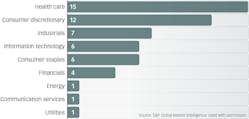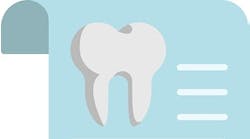Many docs approach the second half of their career with significant uncertainty about the sufficiency of their 401(k) or traditional financial planning to provide security upon retirement. How much is enough? What strategies will create financial security postpractice? What about the potential for recession or another major market correction?
The allure of a lucrative buyout from a DSO may seem a welcome antidote for the fear and uncertainty of the future. More is always better, right? The reality is that banking your financial future on a DSO windfall leaves significant variables out of your control.
Navigating rough waters: Who do you turn to for rescue?
For a dentist metaphorically “drowning” amid the pressures of managing a practice, including financial, regulatory, and operational, any offer that promises relief and certainty can seem like a lifeline. Whether it’s a colleague swimming toward them with support, a small life jacket of an associate buyout, or the lifeboat of a private buyer, these options represent hope.
And then up steams the DSOs in their luxury yachts. They approach dentists with offers that seem to promise not just rescue, but comfort and luxury, sailing into the sunset with tea and crumpets aboard a sophisticated vessel. However, all is not always what it seems. These deals may come with conditions that can affect long-term financial health and autonomy.
The shifting landscape of DSO deals
Private equity is facing significant financial pressures due to high interest rates and the rising cost of capital. This resulted in a spike in bankruptcies for private equity-backed companies (figure 1).
This economic shift has had a profound impact on private equity, including DSOs. The exit strategies offered by many DSOs heavily depend on future recapitalizations—a strategy that becomes less certain as the cost of capital increases. This change has led to a restructuring of buyout models, placing more risk on the shoulders of individual practitioners.
Interest rate manipulation: A window of opportunity
The cost of capital is driven by interest rates—a highly politicized and manipulated reality in today’s economy. There are significant incentives for those in power to create the illusion of a strong economy for as long as possible.
It’s difficult to see a long-term forecast that doesn’t include facing the consequences of decades of dangerous and shortsighted fiscal policy. However, it’s very possible that short-term manipulation creates a window of opportunity in which declining rates allow for some recaps to materialize for existing DSO groups. If you have already entered into a contract and your future payouts are dependent on a recapitalization event, now is the time.
Will this last beyond an election year? All bets are off. For those who are evaluating what path to take, do you want to stake your future on such variables?
The new model: Increased risk for dentists
DSOs are evolving their buyout models to mitigate their own risk, effectively asking dentists to gamble their earnout on unpredictable economic circumstances or factors beyond their control.
Private equity has a history of overpaying for assets. It is unsustainable, and DSOs are now shifting to adapt to market realities. DSOs are now offering less up front, with a significant portion of the payment contingent on future production or other metrics. In these earnout-based agreements, a significant portion of the purchase price is deferred, contingent on the practice’s future performance. This can include dangerous clawback clauses that allow DSOs to force practitioners to pay back any payments received if certain criteria aren’t met in the future. Is the promised multiple worth relinquishing control and entering indentured servitude?
The other concern lies in the uncertainty of recapitalizations in the future. In a world where DSOs cannot recapitalize as planned, they are and will continue to be forced to attempt to squeeze additional profitability from the practices under their control, which in many cases the DSOs grossly overpaid for. Over the last few years, many DSOs have been structured primarily as transaction vehicles versus long-term operators. Some will lack the operational capability to compete, especially in a recessionary environment. In a credit and liquidity contraction, DSOs will continue to be forced to adapt or face significant financial pressure.
What is your financial plan AFTER the practice sale?
The key question remains: Even if a practice owner secures a substantial buyout with favorable terms, what then? Will it be enough to sustain them in retirement? How much is enough? How can you protect your nest egg from market volatility and inflation? What is your plan for using that capital to create sustainable income, so you aren’t forced to slowly eat the golden goose?
Retirement: A transition of assets and skill sets
Traditional retirement planning is too often centered on the accumulation of assets, which you then slowly draw from in retirement. The hope is that you accumulate enough so that your nest egg will outlast your lifetime. This is an uncertain model that leaves you vulnerable to market distress.
A better path to financial security involves the gradual transition of equity from the dental practice into other passive income-generating assets (i.e., real estate). This process allows dentists to reclaim their time and ideally should begin well before considering an exit from their practice.
This process should not take 25–30 years. It can be done in a fraction of the time with the right plan and disciplined effort.
Achieving financial security BEFORE a practice sale
If practitioners are willing to keep a well-managed burn rate and lifestyle overhead, and to take the profit from their practice and deploy it into income-producing assets, it’s possible to reach a position in which you have income streams independent from the practice that are enough to sustain your lifestyle needs. This creates financial independence from the practice and gives dentists a much stronger negotiating position when the time comes to exit practice. Dentists can exit on their own terms, without being desperately dependent on the silver bullet of a significant buyout to sustain financial security in the future.
Funds that become available from a significant liquidity event can be utilized with the same asset-based investing strategy to further expand lifestyle and legacy opportunities. This is a far different path from the traditional retirement model taught by most financial advisors. As with any endeavor, finding the right guide will significantly accelerate your growth curve and folds time.
Before considering a DSO offer
Clarify your numbers. Determine the monthly cash flow necessary to sustain your lifestyle rather than fixating on a vague nest egg value. A focus on cash flow can provide specificity about exactly how much you will need to retire. This will require a clear look at your monthly lifestyle expenses. Clarify where your current net worth is housed and how much of it is efficiently deployed to create sustainable and predictable returns.
Define measurable outcomes. Understand what you truly seek from retirement: Is it time freedom, financial security, generational legacy, or something else? What are your nonnegotiables? How would freedom manifest itself in your life? These conversations are best explored as a couple when relevant. Most families rarely have these conversations.
Plan for life beyond dentistry. What interests or passions do you wish to pursue after dentistry? What is your next goal? There’s a lot of identity wrapped up in a profession for which you’ve sacrificed so many years to master. Without a sense of self-definition beyond the identity of dentistry, it is possible to self-sabotage your exit from practice. Stepping away from the chair will require exploring a new frontier.
Develop financial literacy. Invest in learning about personal finance and asset management. Learn how to be your own financial advocate. This will be a reinvestment phase in yourself and your skill sets (much like dental school or building/acquiring a practice).
Seek unbiased guidance. Consult with advisors who don’t have a financial stake in their retirement decisions, such as independent financial planners or mentors. Be aware of incentives. Many advisors and brokers have a vested interest in advocating for a particular product or model. Seek input from guides whose interests and incentives are aligned with your own.
Understand your true retirement needs
It is possible to create significant autonomy, choices, and options without reliance on a DSO buyout to provide a windfall of profits. Be wary of overreliance on a “home run” transaction to secure your financial future. While these offers might seem like the perfect solution, the changing economic landscape and shifting nature of these deals necessitate a deeper understanding and a more strategic approach. By focusing on building financial acumen and understanding their true retirement needs, dentists can navigate these challenges and secure a retirement that is not just financially rewarding but also personally fulfilling.
Editor's note: This article appeared in the March 2024 print edition of Dental Economics magazine. Dentists in North America are eligible for a complimentary print subscription. Sign up here.
Reference
- Asif MH, Sabater A. Bankruptcies among private equity portfolio companies on track for 13-year high. S&P Global Market Intelligence. August 4, 2023. https://www.spglobal.com/marketintelligence/en/news-insights/latest-news-headlines/bankruptcies-among-private-equity-portfolio-companies-on-track-for-13-year-high-76865450
When his young daughter was hospitalized with leukemia, David Phelps, DDS, founder of Freedom Founders, was able to turn to his alternative investments, step away from his dental practice, and be by her side. He created the Freedom Founders community in 2012 to help dentists and other professionals take control of their retirement investments to produce passive cash flow, security, and live life on their terms. To contact Dr. Phelps, visit freedomfounders.com.









